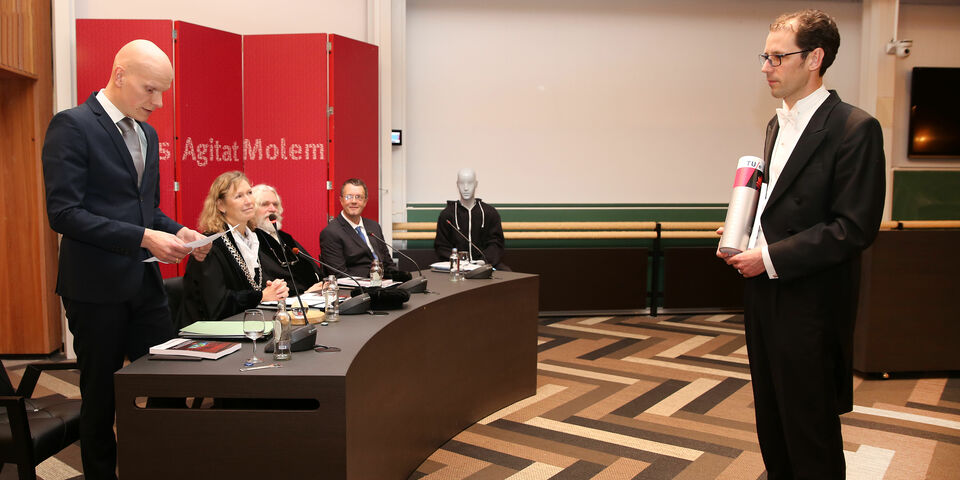‘Right to confer degrees should be extended at every university’
Since 2017 persons other than professors have been entitled to hold the role of supervisor. But the universities agreed to extend this right only to associate professors. Some institutions are not keeping to this arrangement, as research by the Young Academy reveals. Presently at TU/e some 110 associate professors are eligible to confer doctorates.
In 2017 the Upper House of parliament passed legislation proposed by Minister Jet Bussemaker: not only professors, but all associate and assistant professors holding a PhD would be eligible to act as supervisors. The universities found this extension of the right to confer doctorates too broad and under the umbrella of VSNU they drew up additional guidelines. These state other conditions, most notably that only associate professors may act as supervisors, provided they are good researchers and student supervisors in a general capacity.
The Young Academy was pleased with the broader legislation. For years, these young scientists had been working to achieve it. After all, why does a professor take all the credit for supervising PhD students when the work is typically done by others, so ran their primary argument. Ben Donders, policy officer to the Executive Board, told Cursor at the end of 2017 that many associate professors at TU/e were also pleased. They had long felt great frustration, according to Donders, with their unappreciated role as co-supervisor.
Restrictive
More than a year after the legislative proposal, the Young Academy wanted to know what use the universities were making of the new right to confer degrees. They set about comparing all the doctoral regulations. “The differences are huge,” says Martijn Wieling, vice president of the Young Academy. “It shows that many universities don't agree with the umbrella organization VSNU. Likewise, we too believe its guidelines are too restrictive.”
From the overview prepared by the Young Academy it is evident that the conferral right is now being applied more broadly primarily at the two Amsterdam universities. There, associate and assistant professors holding a PhD are eligible to confer doctorates. In some cases they take on this role only once the candidate has started the PhD path, while VSNU prescribes that it must be decided in advance who will take on the role of supervisor. Twente and Wageningen University are much less flexible. There, assistant professors cannot be supervisors. In addition, a further distinction is made among associate professors: anyone on the way to becoming a full professor has priority.
Policy officer Donders reports that similarly at TU/e assistant professors still cannot confer doctorates, but that in September of last year this right was extended to the majority of the associate professors-2, whereas previously the majority of associate professors-1 were the only ones to hold this right. The latter group comprises some sixty individuals; the group of associate professors-2 who gained the right comprises roughly fifty persons.
At present, there is still scope, according to Donders, for promoting an associate professor to the role of lead supervisor in the final phase of a doctoral study. “If this happens, it must be done at least six months before the date scheduled for the conferral of the doctorate, because all sorts of paperwork must be completed. A decision like this must be taken in close consultation with all those involved, including the doctoral candidate.” He expects that with the introduction of the PhD tracking system in September of this year, TU/e may well become stricter on this point. “The names of the supervisors will then be entered right at the start of the doctoral study, although it will still be possible to make changes at a later date in close consultation."
Expert
The Young Academy is keen to see all the universities adopt the same flexible rules. All associate and assistant professors who supervise a doctoral candidate on a daily basis by virtue of being the leading expert in the field should be able to fulfill the role of supervisor, says Wieling. But who will have oversight of the quality of the daily guidance if more and more academics can confer degrees? According to Wieling requirements are going to have to be imposed; anyone who cannot provide good daily guidance, cannot become a supervisor. But, as far as he is concerned, the same should apply to professors. “They aren't always good at providing daily supervision.”
PNN, the network representing the interests of PhD researchers in the Netherlands, shares this view: if a professor, assistant professor of associate professor can't provide good daily guidance, the right to confer doctorates should not be granted or it must be revoked. A more broadly applied conferral right is fine, as long as it is based on quality not status, says PNN president Anne de Vries.
Responsibility
“If more people can become supervisors, universities have a greater responsibility to ensure good supervision. This is still problematical. Universities don't intervene often enough if a professor isn't doing his or her work properly,” says De Vries.
At the moment, a doctoral candidate usually has one supervisor who is a professor, and a daily supervisor - also called a co-supervisor - who is often an associate professor. De Vries argues for appointing two supervisors. Although the status of the supervisor shouldn't be the main factor, she does think it is important that of the two supervisors, one is a professor. “You want to avoid the assessment committee being extra critical because you're being supervised by two assistant professors. The importance of titles is inescapable in academia.”
Vice president Wieling thinks that's not a bad idea. He points out that some universities already appoint two supervisors.


Discussion